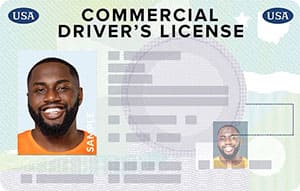- Updated for December 2024
- Based on 2024 OR commercial driver's license manual
Free Oregon CDL Combination Practice Test 2024
Drivers of semi-trucks and tractor-trailers can find economic opportunities in several of Oregon’s economic sectors. Agriculture is a key economic sector, producing wheat, potatoes, fruits (including wine grapes), vegetables, and nursery and greenhouse products. Semi-trucks transport these products to distribution centers and markets across the country and internationally. Although the timber industry has declined in recent decades, the state remains a leading producer of softwood lumber, creating a need for truck drivers experienced in transporting raw timber and wood products. Oregon’s manufacturing industry produces machinery, high-tech equipment, and electronics. These industries depend on truckers to deliver materials to them as well as transport their products. Finally, the Port of Portland, including Oregon’s only deep-draft container port, needs truckers experienced in intermodal transport.
As a big rig driver, however, you may have to drive with extreme caution through much of Oregon in the wintertime. Western Oregon can be rainy, resulting in slippery roads and lower visibility. Also, the Siskiyou Pass is one of the most dangerous sections of road on Interstate 5. This mountain pass has a 6 percent downgrade on six miles of winding, often foggy, snowy, or icy road with sharp curves. Interstate 84, U.S. Route 20, and State Route 58 can also become treacherous under conditions of ice or snow.
If you want to operate heavy combination vehicles like semi-trucks or tractor-trailers so you can take advantage of Oregon’s economic opportunities in trucking, you should obtain a Class A CDL. Besides the usual requirements for a CDL of any class, you’ll also have to pass the official Combination Vehicles knowledge test on the theory of operating combination vehicles. And we can help!
The Combination Vehicles knowledge test is based on the official Oregon Commercial Driver Manual (Oregon CDL Handbook 2024) – but this “study guide” isn’t that easy to study. It’s more like a reference work than a tutorial. That is why you should supplement your reading of the manual with other study tools, such as our practice tests.
This free Oregon Combination practice test is based on the official Oregon Commercial Driver Manual, just like the official knowledge test. And it’s up to date as of December, 2024. It has 25 multiple-choice questions and answers on such topics as combination braking systems, combination driving techniques, coupling and uncoupling, and pre-trip inspections. Each question comes with a helpful hint and an explanation of the correct answer. Unlike the official test, however, this free Oregon CDL Combination practice test has no time limit, and you can retake it as often as you wish to help you learn the material.
- Perfect for first-time and renewal CDL/CLP applicants, and those adding endorsements
- Triple-checked for accuracy
What you need to know

What to expect on the actual OR DMV exam
questions
correct answers to pass
passing score
Helpful links
List of questions (classic view)
- After you lock the kingpin into the fifth wheel, how should you check the connection?
- After you connect the air lines but before you back under the trailer, you should
- Which situation best illustrates the "crack-the-whip" effect?
- When you inspect the landing gear after uncoupling the trailer, where should the tractor be?
- What is the safest way to turn right from a two-way road?
- To drive a triple combination vehicle, you must have
- To prevent a rollover, cargo should be
- Combination vehicles take longer to stop when they are empty than when they are fully loaded, because
- If your vehicle gets stuck on a railroad track, you should
- Low-slung vehicles can be risky at railroad crossings because
- On a double or triple vehicle, which wheels offtrack the most?
- When you're pulling doubles or triples, the shut-off valves should always be
- On a trailer, where is the yellow antilock brake (ABS) malfunction lamp located?
- Even before antilock braking systems (ABS) were required, some vehicles already had them. How can you check if your vehicle has ABS?
- An antilock braking system (ABS) is useful
- After coupling, make sure that the air lines are not crossed. How should you do this?
- During uncoupling, you should disconnect the electrical cable and
- Before you start to uncouple, you must
- You can confirm that air is going to all brakes in your trailers by
- To uncouple a loaded trailer, after the landing gear has made firm contact with the ground, you should
- If the trailer has antilock brakes (ABS) but the tractor doesn't,
- To test the tractor protection valve, charge the trailer air brake system, turn off the engine, and
- If your test of the tractor protection valve is successful,
- The tractor protection valve is designed to close automatically if the air pressure falls into the pressure range specified by the manufacturer, typically
- As part of your vehicle inspection test, if your vehicle is equipped with air brakes and has a trailer, you will inspect the air connections between the truck or tractor and the trailer. Make sure that the ________ are locked in place and free of damage or air leaks.
- Alabama: Test 1 / Test 2
- Alaska: Test 1 / Test 2
- Arizona: Test 1 / Test 2
- Arkansas: Test 1 / Test 2
- California: Test 1 / Test 2
- Colorado: Test 1 / Test 2
- Connecticut: Test 1 / Test 2
- Delaware: Test 1 / Test 2
- District of Columbia: Test 1 / Test 2
- Florida: Test 1 / Test 2
- Georgia: Test 1 / Test 2
- Hawaii: Test 1 / Test 2
- Idaho: Test 1 / Test 2
- Illinois: Test 1 / Test 2
- Indiana: Test 1 / Test 2
- Iowa: Test 1 / Test 2
- Kansas: Test 1 / Test 2
- Kentucky: Test 1 / Test 2
- Louisiana: Test 1 / Test 2
- Maine: Test 1 / Test 2
- Maryland: Test 1 / Test 2
- Massachusetts: Test 1 / Test 2
- Michigan: Test 1 / Test 2
- Minnesota: Test 1 / Test 2
- Mississippi: Test 1 / Test 2
- Missouri: Test 1 / Test 2
- Montana: Test 1 / Test 2
- Nebraska: Test 1 / Test 2
- Nevada: Test 1 / Test 2
- New Hampshire: Test 1 / Test 2
- New Jersey: Test 1 / Test 2
- New Mexico: Test 1 / Test 2
- New York: Test 1 / Test 2
- North Carolina: Test 1 / Test 2
- North Dakota: Test 1 / Test 2
- Ohio: Test 1 / Test 2
- Oklahoma: Test 1 / Test 2
- Oregon: Test 1 / Test 2
- Pennsylvania: Test 1 / Test 2
- Rhode Island: Test 1 / Test 2
- South Carolina: Test 1 / Test 2
- South Dakota: Test 1 / Test 2
- Tennessee: Test 1 / Test 2
- Texas: Test 1 / Test 2
- Utah: Test 1 / Test 2
- Vermont: Test 1 / Test 2
- Virginia: Test 1 / Test 2
- Washington: Test 1 / Test 2
- West Virginia: Test 1 / Test 2
- Wisconsin: Test 1 / Test 2
- Wyoming: Test 1 / Test 2
Your go-to, trusted source
Experience the Driving-Tests differenceOur commitment to accuracy and quality in our practice tests
Explore our rigorous, multi-tiered verification process that ensures each question mirrors the official manual for unparalleled accuracy.

At Driving-Tests.org, we understand the importance of reliable and accurate practice tests to help you prepare for your DMV exam. That's why we've developed a meticulous process to create and continually update our practice questions, ensuring they reflect the most current driving laws and regulations.
Here's an inside look at how we maintain the highest quality in our practice tests.
Content Creation and Verification Process
- Alignment with Official Manuals:
Every question we develop is based on the most recent version of each state's official driving manual. Our team regularly monitors each state DMV's website for the latest updates to ensure our practice tests are always aligned with the most current information. - Community Feedback Integration:
We leverage feedback from our vast community of users to understand which topics are most frequently tested. This helps us focus on the areas that are most relevant and beneficial for your preparation. - Expert Content Creation:
Our in-house editor, Steven, who has extensive experience in driver education, crafts each question with precision. He conducts a thorough review of each question against the official manuals to ensure accuracy. - Rigorous Review Process:
Once Steven has finalized a set of questions, our team conducts a joint review session. This second level of scrutiny involves content accuracy, proofreading, and fact-checking to eliminate any errors. - User Feedback Mechanism:
After a question goes live on our site, we keep the lines of communication open. Each question features a feedback button, inviting users to report any issues or errors. This continuous feedback loop allows us to address and rectify any concerns promptly. - Responsive Updates:
In line with our commitment to accuracy, we quickly update our practice questions to reflect any changes in the DMV manuals. Additionally, we update the free electronic copy of the state's driver's license manuals on our site, typically within a few days after the DMV publishes them.
Our thorough quality control process ensures that you have access to practice tests that are as accurate and up-to-date as possible. We believe in the power of well-prepared drivers and are dedicated to providing you with the best study tools to help you succeed on your DMV exam.
